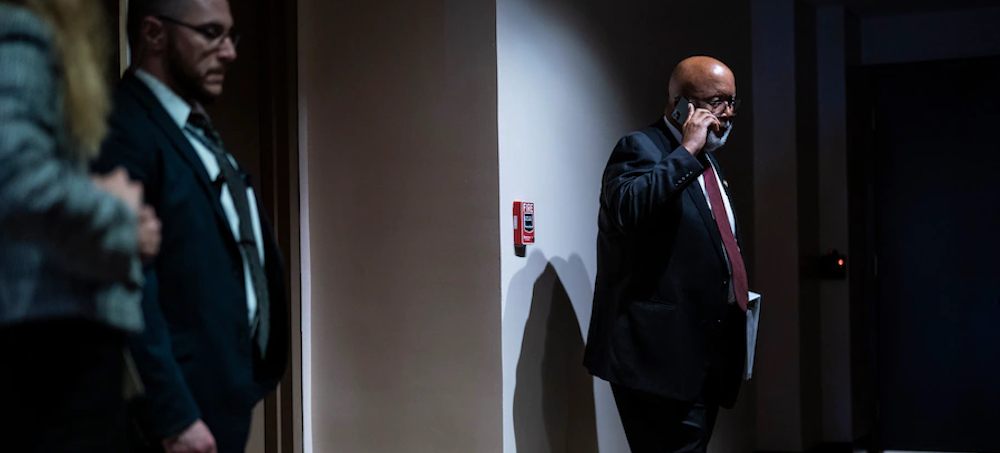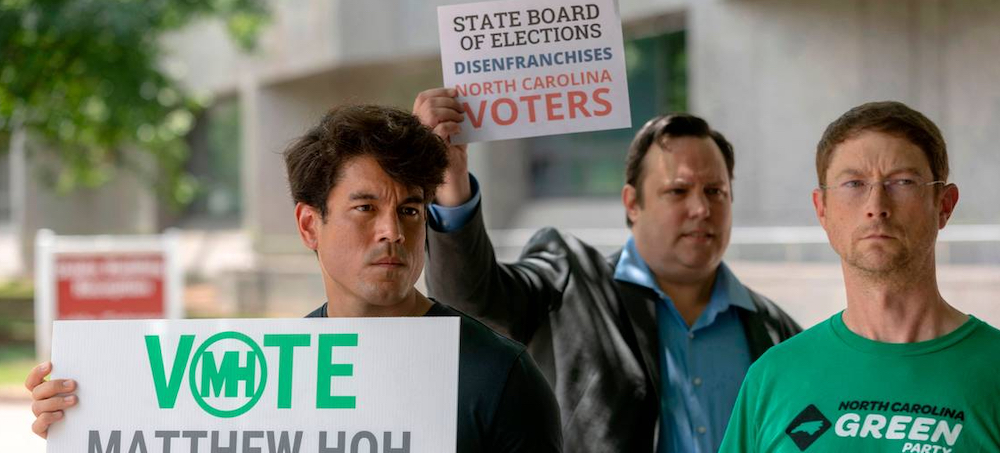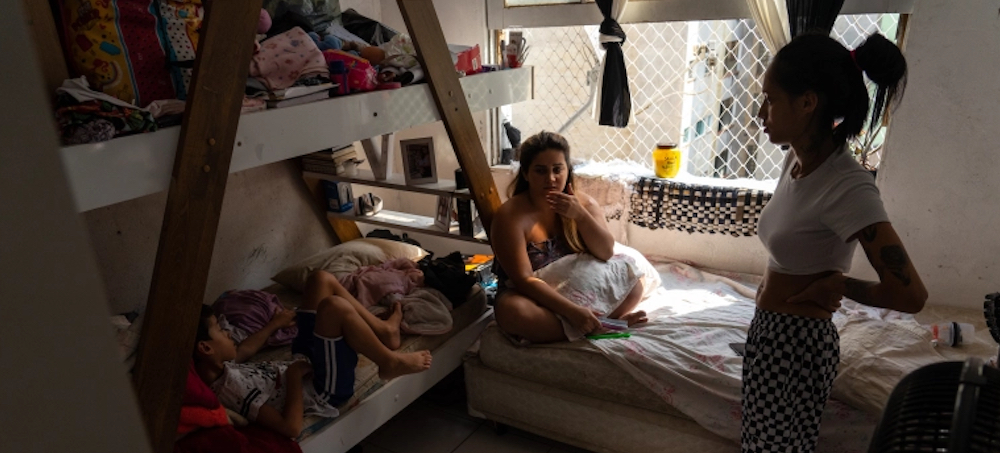Live on the homepage now!
Reader Supported News
 Chairman Bennie G. Thompson (D-MS) talks on the phone as he heads to a meeting with members of the House select committee investigating the Jan. 6, 2021, attack on the U.S. Capitol in Washington on June 21. (photo: Jabin Botsford/WP)
Chairman Bennie G. Thompson (D-MS) talks on the phone as he heads to a meeting with members of the House select committee investigating the Jan. 6, 2021, attack on the U.S. Capitol in Washington on June 21. (photo: Jabin Botsford/WP)
In early February, after learning that the Secret Service’s text messages had been erased as part of a migration to new devices, staff at Inspector General Joseph V. Cuffari’s office planned to contact all DHS agencies offering to have data specialists help retrieve messages from their phones, according to two government whistleblowers who provided reports to Congress.
But later that month, Cuffari’s office decided it would not collect or review any agency phones, according to three people briefed on the decision.
The latest revelation comes as Democratic lawmakers have accused Cuffari’s office of failing to aggressively investigate the agency’s actions in response to the violent attack on the Capitol by supporters of then-President Donald Trump on Jan. 6, 2021.
Cuffari wrote a letter to the House and Senate Homeland Security committees this month saying the Secret Service’s text messages from the time of the attack had been “erased.” But he did not immediately disclose that his office first discovered that deletion in December and failed to alert lawmakers or examine the phones. Nor did he alert Congress that other text messages were missing, including those of the two top Trump appointees running the Department of Homeland Security during the final days of the administration.
Late Friday night, Cuffari’s spokesman issued a statement declining to comment on the new discovery.
“To preserve the integrity of our work and consistent with U.S. Attorney General guidelines, DHS OIG does not confirm the existence of or otherwise comment about ongoing reviews or criminal investigations, nor do we discuss our communications with Congress,” the statement read.
Cuffari, a former adviser to Arizona Gov. Doug Ducey (R), has been in his post since July 2019 after being nominated by Trump.
DHS spokeswoman Marsha Espinosa said the agency is cooperating with investigators and “looking into every avenue to recover text messages and other materials for the Jan. 6 investigations.”
After discovering that some of the text messages the watchdog sought had been deleted, the Federal Protective Service, a DHS agency that guards federal buildings, offered their phones to the inspector general’s investigators, saying they lacked the resources to recover lost texts and other records on their own, according to three people familiar with the plan who spoke on the condition of anonymity to discuss a sensitive investigation.
A senior forensics analyst in the inspector general’s office took steps to collect the Federal Protective Service phones, the people said. But late on the night of Friday, Feb. 18, one of several deputies who report to Cuffari’s management team wrote an email to investigators instructing them not to take the phones and not to seek any data from them, according to a copy of an internal record that was shared with The Post.
Staff investigators also drafted a letter in late January and early February to all DHS agencies offering to help recover any text messages or other data that might have been lost. But Cuffari’s management team later changed that draft to say that if agencies could not retrieve phone messages for the Jan. 6 period, they “should provide a detailed list of unavailable data and the reason the information is unavailable,” the three people said.
Cuffari also learned in late February that text messages for the top two officials at DHS under the Trump administration on the day of the attack were missing, lost in a “reset” of their government phones when they left their jobs in January 2021, according to an internal record obtained by the Project on Government Oversight. But Cuffari did not press the department’s leadership to explain why they did not preserve these records, nor try to recover them, according to the four people briefed on the watchdog’s actions. Cuffari also did not alert Congress to the missing records.
These and other discrepancies prompted key Democrats scrutinizing the attack and the Department of Homeland Security to issue a subpoena to the Secret Service and to call for Cuffari to recuse himself from the investigation.
Reps. Bennie G. Thompson (D-Miss.), chair of the House Homeland Security Committee and the committee investigating the Jan. 6 attack, and Carolyn B. Maloney (D-N.Y.), chair of the committee that oversees inspectors general, said in a letter to Cuffari on Tuesday that they “do not have confidence” that he can conduct the investigation.
Sen. Richard J. Durbin (D-Ill.), chair of the Senate Judiciary Committee, issued a statement Friday calling the missing messages “an extremely serious matter” and said he would ask the Justice Department to intervene.
“Inspector General Cuffari’s failure to take immediate action upon learning that these text messages had been deleted makes clear that he should no longer be entrusted with this investigation,” Durbin said in a statement. “That’s why I’m sending a letter today to Attorney General Garland asking him to step in and get to the bottom of what happened to these text messages and hold accountable those who are responsible.”
Cuffari was asked to answer the lawmakers by Aug. 9.
Cuffari opened a criminal investigation into the Secret Service’s missing text messages this month, one of dozens of inquiries his office does as part of its work overseeing the Department of Homeland Security, the nation’s third-largest agency. Many, including Democrats in Congress, viewed the timing and motive for the inquiry with suspicion, as Cuffari had not pushed to probe the fact that the records were deleted when he first learned of it months earlier. DHS encompasses agencies such as the Secret Service, the Federal Protective Service and immigration and border protection.
Three people briefed on his handling of the missing text messages painted a portrait of an office that faltered over how to handle the matter, even though they had highly skilled officials ready to attack the issue and federal agencies willing to cooperate.
A former senior executive at the inspector general’s office who left the agency this year said Cuffari’s office instructed the executive to call the agency’s top forensic expert on a Saturday early this year to tell him to “stand down” on pursuing the forensics work for the Secret Service’s phones.
“That was done at the direction of the inspector general’s front office,” the former senior executive said, speaking on the condition of anonymity because they are no longer at the office.
Cuffari’s office has continued to issue reports and, on the day the lawmakers called for him to step aside, tweeted about awards that they had won for inspections. The awards are from the Council of the Inspectors General on Integrity and Efficiency, an independent executive agency that supports inspectors general.
In their letter, Thompson and Maloney asked the council to find a replacement for Cuffari on the investigation into the missing Secret Service texts.
The council said it could only help find a replacement if Cuffari decided to recuse himself and asked them for assistance finding a replacement, its executive director, Alan F. Boehm, said in an email.
Cuffari sent a letter to the House and Senate Homeland Security committees this month accusing the Secret Service of erasing text messages from the time around the assault on the Capitol and after he had asked for them for his own investigation.
The Secret Service denied maliciously erasing text messages and said the deletions were part of a preplanned “system migration” of its phones. They said none of the texts Cuffari’s office sought had disappeared.
The Federal Records Act and other laws require federal agencies to preserve government records, and it is a crime, punishable by fines and prison time, to willfully destroy government records.
In addition to the Secret Service, text messages for Trump acting homeland security secretary Chad Wolf and acting deputy secretary Ken Cuccinelli are missing for a key period leading up to the Jan. 6 attack, according to four people briefed on the matter and internal emails.
But Cuccinelli and Wolf both said they turned in their phones, as Wolf put it in a tweet, “fully loaded,” and said it was up to DHS to preserve their messages.
On Twitter, Wolf wrote: “I complied with all data retention laws and returned all my equipment fully loaded to the Department. Full stop. DHS has all my texts, emails, phone logs, schedules, etc. Any issues with missing data needs to be addressed to DHS.”
Cuccinelli, also on Twitter, said he handed in his phone before departing DHS and suggested that the agency “erased” his phone after he left.
The National Archives and Records Administration has sought more information on “the potential unauthorized deletion” of Secret Service text messages, but that inquiry could be delayed by Cuffari’s criminal investigation into the agency. The archives had no immediate comment Friday about Wolf and Cuccinelli’s text messages.
 Ukrainian servicemen in a bus after they were evacuated from Mariupol's besieged Azovstal steel plant. (photo: Alexei Alexandrov/AP)
Ukrainian servicemen in a bus after they were evacuated from Mariupol's besieged Azovstal steel plant. (photo: Alexei Alexandrov/AP)
“We know that the Russian Federation transferred part of the Ukrainian defenders to these barracks a few days before the strike and shelling from the Russian side was recorded,” Podolyak said.
“The purpose (of this crime is) to discredit Ukraine in front of our partners and disrupt weapons supplies.”
“This is a deliberate, cynical, calculated mass murder of Ukrainian prisoners, which requires (a full) investigation. We demand a reaction from the UN and international organizations."
 Supporters of Matthew Hoh in Raleigh, after the Green Party filed a lawsuit against the North Carolina Board of Elections. (photo: Robert Willett/News and Observer)
Supporters of Matthew Hoh in Raleigh, after the Green Party filed a lawsuit against the North Carolina Board of Elections. (photo: Robert Willett/News and Observer)
A woman claiming to represent the state Board of Elections appeared at his home in Fuquay-Varina in late June, a checklist of street addresses in hand, and repeated the request, he said.
When Harney — a 31-year-old historian at the University of North Carolina at Greensboro — refused and questioned the woman’s affiliation, she left with a warning: If Green Party candidates gain ballot access, they could take away votes from Democrats and hand the GOP victories in tight races, namely the Senate race between Democrat Cheri Beasley and Trump-backed Republican Rep. Ted Budd.
“I told her, ‘What you’re doing now makes Democrats look very desperate,’” said Harney, a registered independent. “But, more importantly, it goes against the democratic process because you’re actively trying to ensure another party doesn’t make it onto the ballot.”
A dispute over the Green Party's stalled effort to field a Senate candidate has exposed the Democratic Party's bareknuckle efforts to prevent the progressive group from siphoning away crucial votes come November.
The state Board of Elections' Democratic majority rejected the Green Party petition in a 3-2 vote on June 30, citing petition sheets with nearly identical handwriting, incomplete personal information, duplicate names and deceased signatories.
The Green Party then sued as the board investigates the validity of its signatures, alleging Democratic interference in the petitioning process and asking the court to reverse the board’s decision.
Harney is one of more than a dozen signers mentioned in the lawsuit who reported receiving intimidating messages, calls or home visits.
These signers said some canvassers declined to identify themselves or falsely claimed to represent the Green Party or the elections board. Others said they were sent by the Democratic Senatorial Campaign Committee – the driving force working to elect Beasley and other Democratic Senate candidates nationwide.
With the Senate in a 50-50 deadlock, North Carolina is one of the few states where Democrats have strong potential to pick up a seat, said Western Carolina University political science professor Chris Cooper. Despite the stakes, he found the Democrats' tactics “jaw dropping.”
“This is not politics as usual,” Cooper said. “We expect political parties to want to win – that’s not the problem. It crosses the line when they appear to be resorting to intimidation and, in a few cases, lies.”
The Democrats acknowledge asking signers to remove their names, but claim they were merely trying to make sure potential supporters weren't being tricked.
"We reached out to voters to ensure they had not been deceived,” DSCC spokesperson Amanda Sherman said.
Sherman said the DSCC is funneling $30 million into North Carolina and eight other Senate battleground states through its “Defend the Majority” campaign, the largest investment in field organizing the committee has ever made this early in the campaign cycle.
Though Democrats had little success dissuading progressive voters from backing the Green Party ballot bid, their lawyers, including Elias Law Group, general counsel for the DSCC, lobbied the board to scrutinize irregularities among the signatures.
With its petition rejected, the Green Party missed the July 1 deadline to nominate its candidates for the November ballot. Now the party's choice for Senate, Matthew Hoh, could appear only by court order or legislative action from the General Assembly, which concluded its work session on July 1, elections board spokesperson Patrick Gannon said.
The board will present the findings of its fraud investigation on Monday, one week before the Green Party lawsuit gets its first hearing on Aug. 8.
Hoh’s campaign manager Rose Ruby said their uphill battle to reach the ballot illuminates the many barriers third-party candidates face nationwide. But she embraces Hoh's role as a disruptor of the status quo and says Democrats have only themselves to blame if the Greens “spoil” their election.
“The spoiler label is an antidemocratic characterization of what it means to have a healthy democracy,” Ruby said. “If Democrats don’t want to fear that there’s a split in their vote, then it’s their job to earn those votes and to put out the kind of policies that the Green Party is getting out.”
 A U.S. Border Patrol agent instructs asylum-seeking migrants as they line up along the border wall after crossing the Rio Grande river into the United States from Mexico on a raft, in Penitas, Texas. (photo: Adrees Latif/Reuters)
A U.S. Border Patrol agent instructs asylum-seeking migrants as they line up along the border wall after crossing the Rio Grande river into the United States from Mexico on a raft, in Penitas, Texas. (photo: Adrees Latif/Reuters)
“I’ll always remember the months when the government kept me separated from my two sons."
Under the settlement, which expires in two years, the government has seven days to schedule fingerprinting appointments and 10 days to finish processing them. The Department of Health and Human Services' Office of Refugee Resettlement (ORR), which houses immigrant children who cross the border alone, will also be required to regularly release reports that would, for the first time, track how long fingerprinting takes.
In 2018, the Trump administration started requiring every household member where an unaccompanied child would be living to undergo fingerprinting and an extensive background check, instead of only the sponsor. The policy also required that parents be fingerprinted, which had previously only been done when there was a safety concern.
The widened scope of who was required to be fingerprinted increased the amount of time immigrant children spent in ORR custody by weeks and in some cases even months.
Blanca Ortiz, a plaintiff in the case, said her two sons were in ORR custody for four months as a result of the policy.
“I’ll always remember the months when the government kept me separated from my two sons. There is no greater pain that can be caused than when you separate a child from their mother,” Ortiz said in a statement. "My sons suffered tremendously while in custody. I never, never want to go through this again, and I don’t want this to happen to anyone else. It is inhumane.”
The settlement's deadlines establish measures that would make it difficult for a future administration to reinstate a fingerprinting policy like the one named in the lawsuit, said Stephen Kang, an attorney for the ACLU, which took part in the legal action.
"Even Trump's ORR said this was not workable," Kang said. "Our hope is that the settlement enshrines certain deadlines and time requirements for when fingerprints need to be processed."
The Department of Health and Human Services did not immediately return a request for comment.
After the lawsuit was filed and following public outcry, the Trump administration reversed the background check policy in December 2018. At the time, HHS conceded and said the additional background checks generally failed to produce new information showing the child would be at risk. It only resulted in the unaccompanied children being held longer at shelters.
The New York Civil Liberties Union, the National Center for Youth Law, and the international law firm Morrison Foerster also took part in the lawsuit.
 A family in their home in 9 de Julho. (photo: Mia Alberti/Al Jazeera)
A family in their home in 9 de Julho. (photo: Mia Alberti/Al Jazeera)
Many low-income people have taken over Sao Paulo’s vacant buildings to avoid living on the streets.
Miguel and his father, Cleber, are among the last families living in the historic Prestes Maia, an abandoned building in the heart of the Brazilian city of Sao Paulo that has been occupied by housing rights activists since 2002. Today, the 22-storey high-rise is about to be vacated and transformed into social housing for the families who have squatted here over the last few years.
“It’s wonderful; it’s a big win,” Cleber, who did not provide a last name, tells Al Jazeera. “I came here four or five years ago. It was really good to live here, [with] the opportunities it brought us. There is really no other alternative.”
Sao Paulo is the de facto financial capital of Brazil, known for its lush architecture, upscale restaurants and exclusive neighbourhoods. But another part of town, hidden in plain sight, reflects the city’s deep housing crisis, along with the systemic racism and social inequality that plague this region.
As Latin America’s biggest city, Sao Paulo has failed for decades to solve its severe housing crisis. More than 1.2 million people are in need of adequate housing and, according to figures on the rate of construction provided to Al Jazeera by the city council in 2018, it would take 200 years to have enough social housing for everyone in need.
Against this backdrop, thousands of people have organised into squatting movements, taking matters into their own hands by occupying dozens of buildings across the city, including the Prestes Maia.
The building is run by the Movement for Housing in the Fight for Justice (MMLJ), under the umbrella of a larger group called the Pro-Housing Front (FLM), which says it oversees 35 occupations in Sao Paulo that house approximately 4,500 families.
Prestes Maia, previously a textile factory, had been abandoned for more than a decade when it was occupied in 2002.
“Inside, there was not one electrical wire, one pipe, one toilet,” Manoel del Rio, a lawyer and one of the FLM’s founders, tells Al Jazeera. “A lot of people wanted to give up, but we insisted, and we said it was possible to build a community here.”
Looking around the building - at the halls filled with children’s bicycles, washing machines and clothes-drying racks - del Rio still recalls the day the building was occupied. Activists spent hours cleaning and setting up electrical and water systems for dozens of families, amid pressure from the police who were trying to kick them out.
At the entrance, a woman registers the names of those who enter and monitors security cameras. A sign in the entrance hall reads: “Silence is a prayer, after 10pm it’s mandatory.” Among other rules, violence and drug use are strictly prohibited.
“I usually say to our people inside: If we slip, the society will discriminate against us - it will make us pay. If people outside have to do good, we have to do good tripled,” Ivaneti Araujo, an MMLJ coordinator who runs the Prestes Maia community, tells Al Jazeera.
She knows well the struggles and prejudices that come with this sort of fight. Araujo worked in cotton and sugarcane fields before moving to central Sao Paulo, where she lived under a bridge with her husband and daughters for three months before joining the squatters’ movement. She quickly became a leader and was arrested twice for her activism.
“[Police] called me names. They would say: ‘You are stealing water. It’s a crime.’ And I’d tell them: ‘What you say is a crime, for me is a necessity.’
“We were criminalised many times,” she adds, “because the judicial power does not understand that the government is the one to blame for not guaranteeing a right the families have, but which is violated - so they end up tossing the blame in the movement, in the leadership and in who is fighting.”
Carmen Silva is no stranger to the personal costs of being involved with Brazil’s squatting movements. As a coordinator with the Movement of the Homeless of the Centre (MSTC), she recalls being on the run for 100 days, facing charges after the collapse of an occupied building, and seeing her children arrested. She is still awaiting trial.
“If I talk about the personal side, it’s tough,” Silva tells Al Jazeera. “But if we talk about the political side, we know we are on the right track - that we put a finger in the wounds of the real bandits that are walking around free, that take public money and … leave entire families living in risk areas, in the middle of the street. We are not the bandits.”
Silva fled to Sao Paulo from Bahia in northeastern Brazil in the 1990s to escape an abusive partner. Today, she runs an occupation in 9 de Julho, a building formerly used by the Brazilian Social Security Institute and currently home to more than 400 squatters.
In the kitchen, two women peel and fry plantains in a large pan. Silva oversees the cooking, issuing instructions like an army captain to defrost 50kg (110 pounds) of meat, cook a bechamel sauce, and boil chickpeas and rice, ahead of an open-door lunch that feeds hundreds every Sunday.
Surrounding the building is vibrant street art, a communal garden, a compost area, a clothing store and an art workshop. During the pandemic, the building also became a COVID-19 vaccination centre for children. Social workers, psychologists and family doctors pay frequent visits.
This collaboration with public services and the surrounding community is a major source of pride for Silva: “It’s what stands us apart. Social movements have to understand that we have to have a balance between the movement, the public power and the private power itself.
“A house is not just a place to get in and lock yourself in,” she adds. “Housing is the doorway to other rights: culture, education and health.”
But this type of community outreach hasn’t been easy in a “machista” society like Brazil, Silva says. As a Black woman, sitting at the table with mostly white male government officials has required “breaking some cycles” and smashing glass ceilings along the way.
“Today, I sit at the table with every social class, especially with the government, to try and maintain a dialogue,” she says. “But there is prejudice - there is, there was and there will always be.”
Filipe Figueiredo, who manages the clothing shop on the ground floor, says squatters like himself are often stereotyped as “poor, drug users, lowlives, bandits” - but that’s far from reality.
As he speaks, he sorts through the latest arrivals of second-hand shirts, dresses and trousers. He adjusts the positions of bracelets and necklaces on the store’s shelves, and carefully dresses a mannequin outside.
Figueiredo, a marketing student, says this job is his main source of income. The current minimum wage of 1,212 Brazilian reals ($233) is not enough to cover the costs of living in the city. The average monthly rent in central Sao Paulo has steadily risen over the years, now standing at about 3,500 reals ($665). At the building Silva manages, each family unit pays 220 reals ($41) a month to cover administrative costs.
For Figueiredo, like many low-income workers - so often the essential workers who keep the city running - living on the outskirts is not a viable option.
“The lack of social housing options in the centre of the city is the proof of oblivion: that we are a minority, and they don’t care about us,” he tells Al Jazeera.
Sao Paulo is the most unequal city in Brazil with regards to access to employment close to home, according to a recent study by the Institute of Applied Economic Research. “The richer and white population, on average, has more access to opportunities than the poor, Black population,” the study notes, citing an inequitable distribution of transport networks, infrastructure and urban development.
A number of occupations in Sao Paolo have led to incremental progress. In recent years, the famous Hotel Cambridge occupation led to its conversion into social housing, while activists occupying the abandoned Lord Palace Hotel eventually won the right to live there legally.
FLM coordinator Osmar Borges remembers the day the Lord Palace was occupied: Families carrying their belongings queued to enter, as volunteers handed out cups of coffee. Everyone fell silent in the abandoned building as police drove by on the street outside.
Today, he proudly shows Al Jazeera the benefits of years of fighting. Construction workers push wheelbarrows, the buzz of chainsaws echoes through empty hallways, and electrical cords hang from ceilings, awaiting lightbulbs for more than 170 apartments.
“We won the battle,” Borges says.
The aim of such occupation movements, he says, is to present evidence to the city council that a building meets the criteria for conversion to social housing. If approved, the state can then finance renovations. For the Lord Palace Hotel, the government paid nearly 22 million reals ($4.2m) to buy and renovate the building, Borges says.
Sao Paulo’s housing secretary declined Al Jazeera’s request for an interview, but a spokesperson said via email that the city council had given 33,000 homes to needy residents over the past five years, with another 13,000 currently under construction. The city has “amplified the tools to answer the vulnerable population in order to reduce the housing deficit”, including through the building of social housing and the acquisition of properties for low-income families.
At the same time, the spokesperson said, the city is working to identify and register the residents of 51 occupied downtown buildings “to start a study in order to find alternatives to de-occupy and help the families”.
In the case of the Lord Palace Hotel, once the work is complete and people move back in, each family unit will pay 10 percent of their income as rent for a decade, after which the city council will grant them official ownership, Borges says.
“The conquest of a building in the centre of the city is very symbolic,” he says. “It represents the fall of taboos, prejudice, discrimination, the resistance to having poor people living closer to the middle class.
“Unfortunately, we live in a country with an enslaver mentality, in which Black, poor, northeastern … people remain slaves of a low salary that doesn’t allow them to buy a house, feed themselves, guarantee a dignified life for their family.”
Araujo cannot wait for the Prestes Maia to be renovated, and to see the families she helped over the years re-enter as proud homeowners.
“It’s a relief knowing that everything we planted, we are now harvesting,” she says.
But the fight must continue with more occupations, she adds: “If you don’t fight, you are dead. Rights don’t come to those who sleep,” she says with a smile.
During the 20 years of the Prestes Maia occupation, about 600 families that lived there have since found homes, Araujo says. In 2010, the 460 families living there at the time received social housing or credits to buy a house from the government, she adds.
One of them was the family of Kethelem Rodrigues, who moved into the Prestes Maia when she was nine. They previously lived in precarious conditions on the city’s outskirts, relying on the help of neighbours to eat and survive - a memory that still brings tears to Rodrigues’s eyes.
“If we hadn’t met the movement, I don’t even know if we would be alive - and if we were, we would be living on the streets, hungry,” she tells Al Jazeera.
Her mother became a strong housing rights advocate, and after she died in 2020, Rodrigues followed in her footsteps: In November 2021, she led the occupation of an old Itaquaquecetuba factory on the outskirts of Sao Paulo, giving dozens of families a place to live.
“It’s the only thing we know how to do - to help people in this situation, because it’s what we learned since we were little,” she says.
Many residents are Black, single mothers. “People say: ‘Go to work.’ But they don’t understand the situation,” she adds. “How will a person work with a bunch of kids, without having food at home? They get evicted and end up in the streets. How will you find a job without an address?
“I’m the daughter of a Black woman,” Rodrigues says. "The movement opens these doors for women, especially Black women.”
Today, she says, the need for adequate housing is more urgent than ever. The COVID-19 pandemic has left many people jobless, hungry and unhoused. In the last four years, the number of people living in the streets of Sao Paulo has doubled, from 15,000 to more than 31,000, according to figures provided to Al Jazeera by the city council.
Stefanie, 30, lives in the occupied factory with her four children and five nephews. She worked as a waitress before the pandemic shut down the service sector. Today, she spends her days sewing hundreds of purses, which sell for $0.50 apiece. She requested government housing more than 10 years ago, but amid soaring demand, her request remains unanswered.
“If I depended on the government, I’d be on the streets,” Stefanie, who did not provide a last name, tells Al Jazeera.
Ana Paula de Almeida, 33, also lives with her family in a shed in a corner of the old factory. Inside, there’s a stove, some boxes with their belongings, and a double mattress where she and her husband sleep with their three children.
“We used to live in a flat, but we either ate or paid the rent,” she tells Al Jazeera.
Ana Paula fights back tears as she remembers her family sleeping on the streets during the pandemic - the “worst days” of her life.
“This [occupation] is the best thing that happened in my life, because now my kids have breakfast, lunch and dinner,” she says. “I never thought I’d go through this, but now I’m proud of these people. They saved our lives.”
Her eight-year-old son, Joao Vitor, already understands the struggle his family is facing.
“It’s good to live here,” he says, holding his baby brother. “It’s better than going hungry.”
Just as Rodrigues’ mother inspired her to become an activist, she is now trying to inspire others, including young Joao Vitor, to do the same.
“When I grow up, I want to be like the leaders of the movement, because I want to help others,” the young boy says with a smile. “Because helping others is quite cool, right?”
His words resonate deeply with Rodrigues.
“It’s heartbreaking … but there are no housing policies; people are forgotten, and not just in Sao Paulo,” she says. “Everyone has a sad story, but you have to get up and run after change. If you don’t, you will live and die this way, because no one will help you except the movement which [helped] my family and is now helping other people here too.
“The people have to wake up. Change has to come from the bottom up,” she adds. “It’s always from the bottom up - never from the top down.”
 A tiger. (photo: Shutterstock)
A tiger. (photo: Shutterstock)
Nepal was home to 121 tigers in 2010, the same year that it and 12 other tiger range countries agreed to double the population of Panthera tigris by the next Year of the Tiger in the Chinese zodiac, which is 2022. Following the latest census, the country is now home to 355 tigers, Prime Minister Sher Bahadur Deuba announced at an International Tiger Day event in Kathmandu.
“This success was possible due to the unwavering political will of the government of Nepal, contributions of many stakeholders including enforcement agencies and conservation partners, but most of all the communities that live alongside tigers,” said Pem Narayan Kandel, secretary at the Ministry of Forests and Environment.
“A key challenge moving forward is to ensure cohabitation between people and nature, as well as to reconcile the country’s growth aspirations with the need to keep nature secure.”
Amid the euphoria, and with no other tiger range country expected to see a doubling of their big cat population since 2010, there’s growing concern in Nepal that the country’s tiger habitats may have hit their carrying capacity. Conservationists warn this may further aggravate the threat of human-wildlife conflict in a country, where three people have been killed every month on average in encounters with tigers in the last fiscal year.
The new total is just 45 tigers shy of the approximately 400 that conservationists and experts consider the carrying capacity of the country’s limited habitat for the big cats. In the Chitwan-Parsa complex, the most important tiger habitat in Nepal, the subpopulation of 169 tigers is already close to carrying capacity of 175 calculated in a government study.
Even before the latest census figures were released June 29, local community representatives had warned that the country’s protected areas may have already hit their carrying capacity.
However, conservationists involved in the census and the carrying capacity study say that upper limit isn’t set in stone, and that with improved habitat management, Nepal can host even more tigers.
“Carrying capacity of protected areas are not constant, they change with time,” said Babu Ram Lamichhane, a biologist with the National Trust for Nature Conservation, a semigovernmental body.
“When we estimated the carrying capacity of the Chitwan-Parsa complex, we hadn’t factored in the areas outside protected areas, especially the community forests,” he added. “As we are yet to conduct carrying capacity studies in other habitats, we can say that we certainly haven’t hit the carrying capacity yet.”
This article was originally published on Mongabay.
Special Coverage: Ukraine, A Historic Resistance
READ MORE
Follow us on facebook and twitter!
PO Box 2043 / Citrus Heights, CA 95611



No comments:
Post a Comment
Note: Only a member of this blog may post a comment.